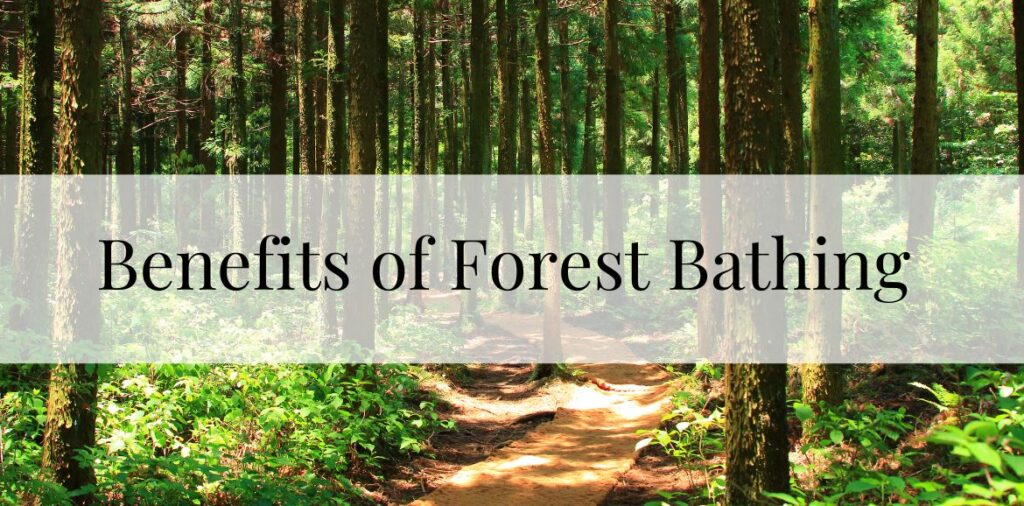
Forest bathing, or Shinrin-yoku as it’s known in Japan, is a wonderful practice with numerous health benefits. Imagine it as a therapeutic immersion in nature, particularly in lush, green forests. Forest bathing works scientifically through a combination of physiological, psychological, and emotional mechanisms. Let’s delve into some of the incredible health benefits and the key scientific aspects:

- Stress Reduction: Spending time in nature, surrounded by trees and the soothing sounds of the forest, has been shown to lower cortisol levels and reduce stress. It’s a natural remedy for the hustle and bustle of daily life.
- Reduced Cortisol Levels:
- What Happens: Spending time in nature, away from the stressors of urban life, has been linked to a decrease in cortisol, the stress hormone.
- Scientific Insight: Lower cortisol levels contribute to a more relaxed state, reducing the physiological impact of chronic stress on the body.
- Increased Parasympathetic Nervous System Activity:
- What Happens: Forest environments promote a shift towards parasympathetic nervous system dominance, often referred to as the “rest and digest” mode.
- Scientific Insight: This shift is associated with relaxation, improved digestion, and better overall recovery from stress.
- Reduced Cortisol Levels:
- Improved Mood: Forest bathing has a positive impact on mental health. The phytoncides released by trees have been linked to increased production of serotonin, the neurotransmitter associated with mood regulation.
- Positive Impact on Mood and Serotonin Levels:
- Scientific Insight: Higher serotonin levels are linked to improved mood and a reduced risk of mood disorders such as depression.
- Positive Impact on Mood and Serotonin Levels:
- Boosted Immune System: Breathing in the fresh, forest air may enhance your immune function. Phytoncides have antimicrobial properties that can support your body’s defense against pathogens.
- Phytoncides and Immune Function:
- Scientific Insight: Inhaling these phytoncides during forest bathing can stimulate the production of natural killer (NK) cells and other components of the immune system, enhancing your body’s defense against pathogens.
- Phytoncides and Immune Function:
- Better Focus and Concentration: Time in nature has been linked to improved cognitive function. If you’re feeling mentally fatigued, a stroll through the woods can rejuvenate your mind and enhance concentration.
- Increased Energy Levels: Rather than draining your energy, spending time in nature replenishes it. The combination of fresh air, sunlight, and the calming environment can leave you feeling invigorated.
- Enhanced Creativity: Nature has a way of unlocking creativity. If you’re seeking inspiration or a fresh perspective, a walk in the woods might just be the spark you need.
- Positive Impact on the Prefrontal Cortex:
- What Happens: Nature exposure has been linked to increased activity in the prefrontal cortex, the part of the brain associated with executive functions.
- Scientific Insight: This may explain improvements in focus, concentration, and decision-making observed in individuals who engage in forest bathing.
- Positive Impact on the Prefrontal Cortex:
- Lower Blood Pressure: Nature has a calming effect on the cardiovascular system. Studies suggest that regular forest bathing can contribute to lower blood pressure and lower heart rate, promoting heart health.
- Improved Heart Health:
- Scientific Insight: These changes contribute to cardiovascular health by reducing the workload on the heart and promoting overall circulatory well-being.
- Improved Heart Health:
- Improved Sleep: Exposure to natural light during the day, especially sunlight, helps regulate your circadian rhythm. This can lead to better sleep at night, contributing to overall well-being.
- Balancing Circadian Rhythms:
- Scientific Insight: A well-regulated circadian rhythm is crucial for healthy sleep patterns and overall physiological balance.
- Balancing Circadian Rhythms:
- Mind-Body Connection: Forest bathing encourages mindfulness and being present in the moment. This mind-body connection can have profound effects on your overall mental and emotional health.
- Mindfulness and Cognitive Benefits:
- Scientific Insight: Mindfulness practices have been shown to enhance cognitive function, including attention, memory, and problem-solving skills.
- Mindfulness and Cognitive Benefits:
- Social Connection: Forest bathing can be a shared experience, promoting social interaction. Connecting with loved ones or friends in a natural setting can strengthen relationships and provide additional mental health benefits.
- Social Interaction and Oxytocin Release:
- Scientific Insight: Social connections and interactions stimulate the release of oxytocin, the “bonding hormone,” contributing to feelings of well-being.
- Social Interaction and Oxytocin Release:
Understanding these scientific mechanisms reinforces the holistic benefits of forest bathing, aligning with a complete approach to health that encompasses both the physical and emotional dimensions. It’s a beautiful integration of nature’s therapeutic elements into the fabric of whole body health.







